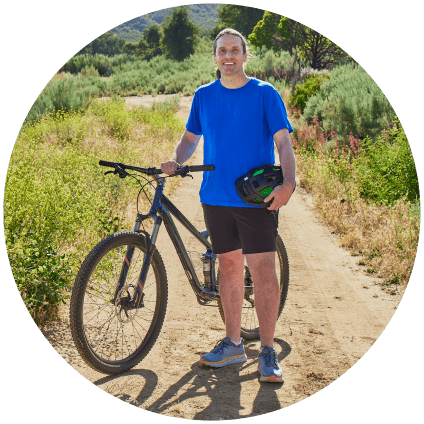See and hear the stories of real patients taking VOQUEZNA (vonoprazan).

CARSON’S STORY: HEARTBURN RELATED TO
NON-EROSIVE GERD
Carson, a patient in the clinical trials, found heartburn relief with VOQUEZNA.
Individual results may vary. The patient was compensated by Phathom for his time sharing his individual experience in the trial.

Carson’s Story: Heartburn Related to Non-Erosive GERD
Carson, an avid cycler and improv actor, began to experience heartburn related to Non-Erosive Gastroesophageal Reflux Disease (GERD) in 2022. He noticed heartburn that became increasingly irritating. Eventually, Carson became concerned and was referred to a gastroenterologist.

My heartburn became more severe, so I made an appointment with a
gastroenterologist who diagnosed me with heartburn related to Non-Erosive GERD.
After discussing treatment options with his doctor, Carson was prescribed a proton pump inhibitor (PPI). He also tried cutting out acidic foods to control his heartburn. But unfortunately, his heartburn persisted. After trying different PPIs and over-the-counter antacids with little relief, Carson knew it was time for a different treatment.

I was looking for a different treatment option, and my doctor suggested I sign up for the VOQUEZNA clinical trial.
Carson was enrolled in the VOQUEZNA clinical trial for patients with heartburn related to Non-Erosive GERD, and over time his heartburn began to lessen. These days, Carson is looking ahead and hopes to keep pedaling into the future with the wind at his back.

Carson was enrolled in the VOQUEZNA clinical trial for patients with heartburn related to Non-Erosive GERD, and over time his heartburn began to lessen. These days, Carson is looking ahead and hopes to keep pedaling into the future with the wind at his back.

I’m happy to report that, thanks to VOQUEZNA, my heartburn no longer
takes the center stage in my life.
KEVIN’S STORY: EROSIVE ESOPHAGITIS
Kevin, a patient in the clinical trials, healed his EE with VOQUEZNA.
Individual results may vary. The patient was compensated by Phathom for his time sharing his individual experience in the trial.
Kevin’s Erosive Esophagitis story
Kevin
Age: 33
Living with heartburn for years.
Later diagnosed with Erosive Esophagitis (EE).
VOQUEZNA is a prescription medicine for adults, used to heal acid-related damage to the lining of the esophagus (called Erosive Esophagitis) and relieve related heartburn as well as for the maintenance of healing and relief of related heartburn.
‘‘I’m Kevin, I’m 33 years old. I’m a woodshop teacher in a junior high school.
So it first started when I was in college—I don’t know, 18, 19, 20-ish, around there. It started out with just kind of a pain in my throat and then steadily got worse until it was to the point where I couldn’t stand it anymore.
I didn’t realize what I was experiencing could be Erosive Esophagitis. Then I heard about the VOQUEZNA clinical trial.’’
Hear more from Kevin next
Kevin took an investigational treatment that was later approved as VOQUEZNA® (vonoprazan) tablets to treat all grades of Erosive Esophagitis as part of the pHalconEE Phase 3 clinical trial.
VOQUEZNA® (vonoprazan) tablets was approved by the US Food and Drug Administration on November 1, 2023 for the treatment of Erosive Esophagitis in adults.
IMPORTANT SAFETY INFORMATION
Do not take VOQUEZNA if you:
- are allergic to vonoprazan or any of the other ingredients in VOQUEZNA. Allergic reaction symptoms may include trouble breathing, rash, itching and swelling of your face, lips, tongue or throat.
- are taking a medicine that contains rilpivirine (EDURANT, COMPLERA, JULUCA, ODEFSEY) used to treat HIV-1 (Human Immunodeficiency Virus).
Please see additional Important Safety Information at the end of this video.
The patient was compensated by Phathom for his time sharing his individual experience in the trial. Individual results vary and are not generalizable across the entire study population.
“I signed up for a clinical trial, and one of the first things they did was an endoscopy that confirmed I had Erosive Esophagitis.
I was pretty happy finding out about a trial that I could participate in for a drug that wasn’t on the market.
The first two weeks, I was on a 20-milligram dose; then I went for another endoscopy where they saw my erosions were healed. At that point, I started taking a 10-milligram dose of VOQUEZNA. I was on that lower dose for the rest of the trial.
At the end of the trial, they gave me another endoscopy and found I had maintained healing.
I would definitely say to anyone that’s suffering from Erosive Esophagitis: Honestly, it worked really well for me. I even suggested to my brother, who also has EE, that he should try to get into the clinical study.
If you have Erosive Esophagitis, consider asking your doctor if VOQUEZNA is right for you.”
IMPORTANT SAFETY INFORMATION (CONTINUED)
Before taking VOQUEZNA, tell your healthcare provider about all your medical conditions, including if you:
- have low magnesium, calcium, or potassium in your blood, or you are taking a medicine to increase urine (diuretic).
- have kidney or liver problems.
- are pregnant, think you may be pregnant, or plan to become pregnant. It is not known if VOQUEZNA will harm your unborn baby.
- are breastfeeding or plan to breastfeed. It is not known if VOQUEZNA passes into your breast milk. You and your healthcare provider should decide if you will take VOQUEZNA or breastfeed. You should not do both.
Tell your healthcare provider about all the medicines you take, including prescription and over-the-counter medicines, vitamins, and herbal supplements. Keep a list of them to show your healthcare provider and pharmacist when you get a new medicine.
VOQUEZNA may affect how other medicines work, and other medicines may affect how VOQUEZNA works. Especially tell your healthcare provider if you take medicine that contains rilpivirine (EDURANT, COMPLERA, JULUCA, ODEFSEY).
What are the possible side effects of VOQUEZNA?
VOQUEZNA may cause serious side effects including:
- A type of kidney problem (acute tubulointerstitial nephritis): Some people who take VOQUEZNA may develop a kidney problem called acute tubulointerstitial nephritis. Call your healthcare provider right away if you have a decrease in the amount that you urinate or if you notice blood in your urine.
- Diarrhea caused by an infection (Clostridioides difficile) in your intestines: Call your healthcare provider right away if you have watery stools, stomach pain, and fever that does not go away.
- Bone fractures (hip, wrist, or spine): Bone fractures in the hip, wrist, or spine may happen in people who take multiple daily doses of another type of medicine that reduces acid in your stomach known as proton pump inhibitors (PPI medicines) for a long period of time (a year or longer). Tell your healthcare provider if you have a bone fracture, especially in the hip, wrist, or spine.
- Severe skin reactions: VOQUEZNA can cause rare, but severe skin reactions that may affect any part of your body. These serious skin reactions may need to be treated in a hospital and may be life threatening:
- Skin rash which may have blistering, peeling, or bleeding on any part of your skin.
- You may also have fever, chills, body aches, shortness of breath, or enlarged lymph nodes.
If you experience any of these symptoms, stop taking VOQUEZNA and call your healthcare provider right away. These symptoms may be the first sign of a severe skin reaction.
- Low vitamin B-12 levels: VOQUEZNA lowers the amount of acid in your stomach. Stomach acid is needed to absorb Vitamin B12 properly. Tell your healthcare provider if you have symptoms of low vitamin B12 levels, including irregular heartbeat, shortness of breath, lightheadedness, tingling or numbness in the arms or legs, muscle weakness, pale skin, feeling tired, or mood changes. Talk with your healthcare provider about the risk of low vitamin B12 levels if you have been on VOQUEZNA for a long time.
- Low magnesium levels in the body can happen in people who take VOQUEZNA. Tell your healthcare provider right away if you have symptoms of low magnesium levels, including seizures, dizziness, irregular heartbeat, jitteriness, muscle aches or weakness, or spasms of hands, feet, or voice.
- Stomach growths (fundic gland polyps): A certain type of stomach growth called fundic gland polyps may happen in people who take another type of medicine that reduces acid in your stomach known as proton pump inhibitors (PPI medicines) for a long time. Talk with your healthcare provider about the possibility of fundic gland polyps if you have been on VOQUEZNA for a long time.
The most common side effects of VOQUEZNA for treatment of Erosive Esophagitis include:
- stomach inflammation
- diarrhea
- stomach bloating
- stomach pain
- nausea
- indigestion
- high blood pressure
- urinary tract infection
These are not all the possible side effects of VOQUEZNA. For more information, ask your healthcare provider or pharmacist. Call your healthcare provider for medical advice about side effects.
You are encouraged to report suspected adverse reactions by contacting Phathom Pharmaceuticals at 1-888-775-PHAT (7428) or FDA at 1-800-FDA-1088 or www.fda.gov/medwatch.
Please see the link at the top of this page for Patient Information and full Prescribing Information for VOQUEZNA.
© 2024 Phathom Pharmaceuticals. All rights reserved. 7/24 US-VPZ-24-0517

If you’d like to share your VOQUEZNA story, simply call us at 1-844-682-7236, Monday to Friday, 9AM-9PM EST.
See if you are eligible for prescription savings
Commercially insured patients may be able
to save on their VOQUEZNA prescription.
Talk to your doctor
Our doctor discussion guide can help you figure
out where to start.

